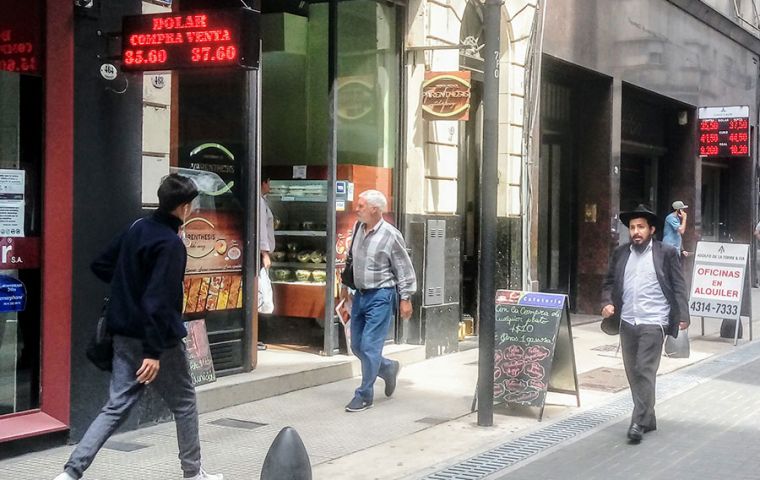MercoPress. South Atlantic News Agency
Dollar, prices go up in inflation-ridden Argentina
 Dollars were traded at between $ 37.70 and $ 37.25, depending on each bank.
Dollars were traded at between $ 37.70 and $ 37.25, depending on each bank. The US dollar rose 22 cents against the Argentine peso and closed at a 1 US$/ AR$37.50 parity on Thursday. It was the second day in a row for an upward trend following seven straight slumps.
Meanwhile, inflation kept prices on the rise, particularly for primary products, utilities, imported items and construction. In September, the Wholesale Price Index rose 16% and the Construction Cost 7.3%, according to the National Institute of Statistics and Censuses (Indec).
Dollars were traded at between $ 37.70 and $ 37.25, depending on each bank. The state-owned Banco Nación closed at $ 37.50, which meant a 40 cent increase in their quotation, still below the 47 cent rise which brought wholesale trading to
AR$ 36.65 / 1 US$.
The Central Bank (BCRA) issued $ 152,373 million worth of 7 day Liquidity Letters (bonds) at an average rate of 72.53%.
The INDEC report released Thursday showed wholesale prices accumulated a rise of 66.1% so far this year, while the cost of construction rose 32.5%. Retail inflation was 6.5% in September and 32.5% so far this year.
The increase in wholesale prices was driven by an increase of 18.1% in primary products, 24.5% in oil and gas, 24.7% in imported products, and 2.8% in electricity.
Wholesale prices were heavily affected by by an increase of 129% in crude oil and gas, 53% in farming, 47% in electricity, and 104% for imported products. For its part, construction were the combined result of an increase of 14.1% in materials, 3.3% in labour, and 3.5 % in general expenses.
Finance Minister Nicolas Dujovne said in that the government “will continue with a very firm policy of controlling the monetary aggregates until achieving substantially low inflation.”




Top Comments
Disclaimer & comment rules-

-

Read all commentsA single term of 4 years is nowhere near long enough to put right the damage done during 12+ years of Kirchnerist looting and costly vote-buying. Margaret Thatcher was extremely unpopular - for similar reasons - during her first few years until she was saved by your lot. Britain has a lot to thank Galtieri such an under-rated gentleman - he should have a statue if not in Trafalgar Square, then in Port Stanley. Perhaps Macri should secretly encourage the kelpers to invade Tierra del Fuego, so that he can win a couple more elections? A win-win strategy surely?
Oct 22nd, 2018 - 06:56 am +1”...controlling the monetary aggregates until achieving substantially low inflation.”
Oct 20th, 2018 - 05:03 am -1Minister Dujovne, same as other officials and Mauricio Macri himself, believes in the magic power of words, even at a time when all sectors of the Argentine economy fall apart.
The Argentines, however, have been exceedingly tolerant and allowed almost three years of honeymoon to a government that has relentlessly eroded their purchase power, while allowing fortunes to be made through financial speculation.
Such is the scheme of the rich and powerful: to convince the masses of the unwashed to endure poverty now in exchange of a promise of future wellbeing. A future that will be permanently pushed ahead like a desert mirage.
However, nobody can trick all the people all the time: Since September, opinion polls are attributing a majority vote intention to Cristina Fernandez de Kirchner. Not even the notebook photocopies affair has made the dent on Cristina numbers the government was hoping it would.
As I said, you cannot keep selling snake oil forever.
Commenting for this story is now closed.
If you have a Facebook account, become a fan and comment on our Facebook Page!